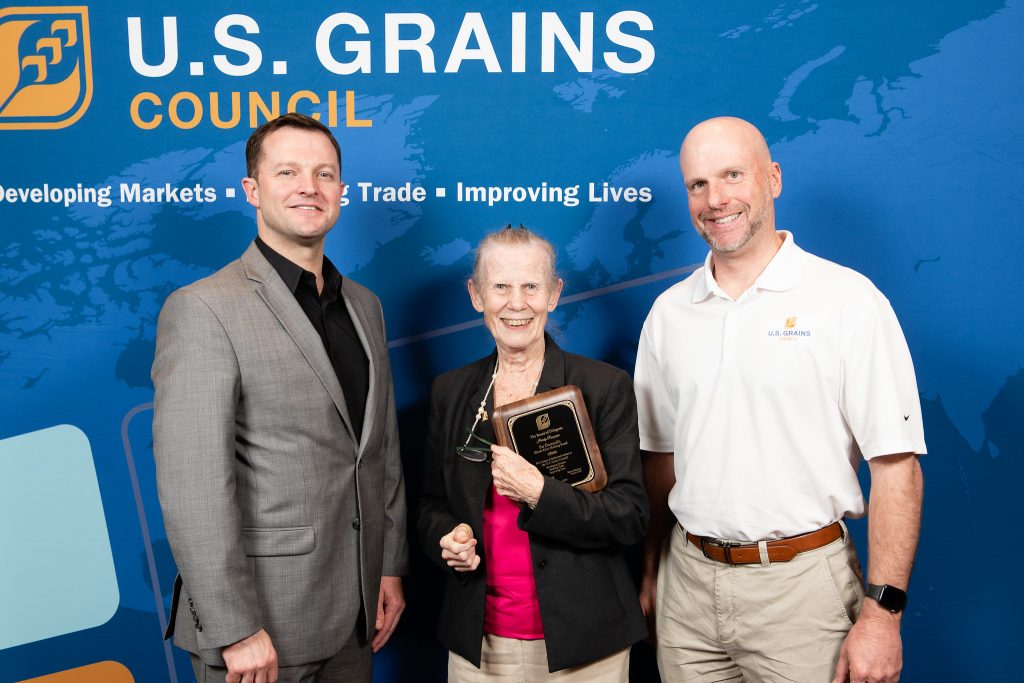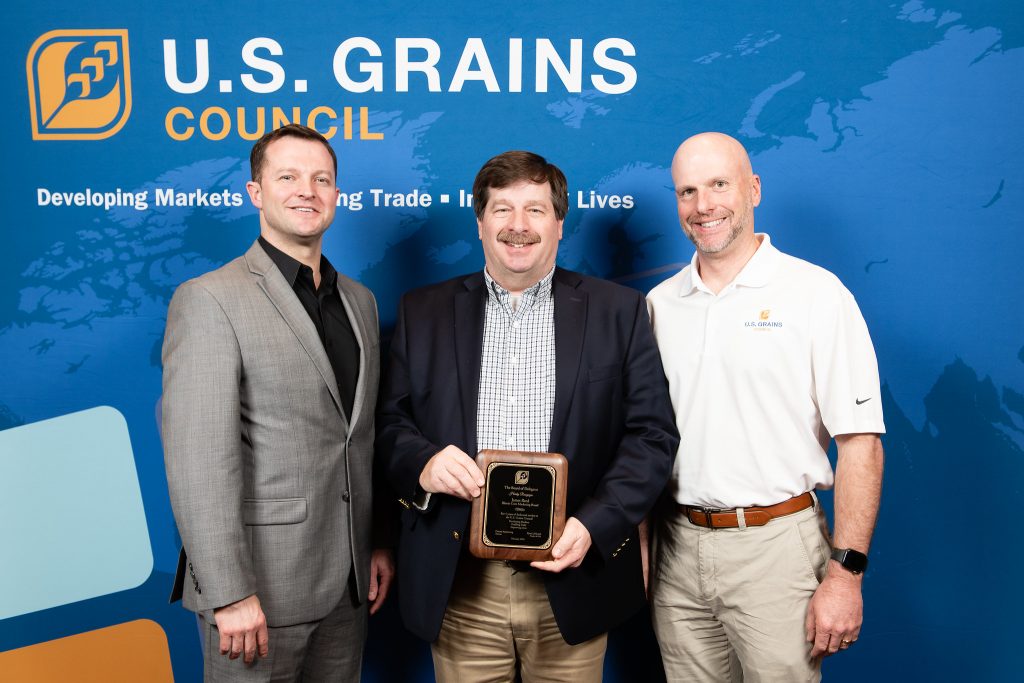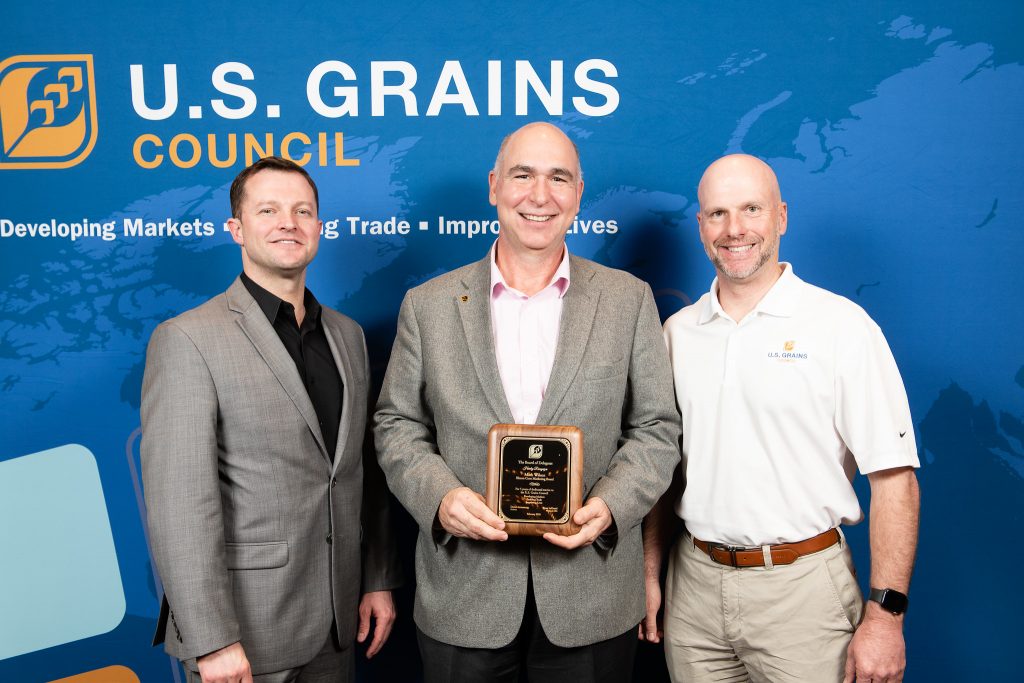From grandkids to community service, corn is far from the only thing raised by the farmers who represent the Illinois Corn Marketing Board on the U.S. Grains Council (USGC). The Council recognized three of these farmer delegates for five years of service at the 17th International Marketing Conference and 60th Annual Membership Meeting in Tampa, Florida: Pat Dumoulin, Jim Reed and Mark Wilson.

Dumoulin has been involved at the state level with either a corn or soybean association for the last 39 years, with one more term left on the Illinois Corn Marketing Board. Her passion for trade started when she worked as a college professor teaching economics.
Understanding the principles of supply and demand and comparative advantage made serving on advisory teams related to trade a natural fit. She said she jumped at the chance to serve on teams like the Council’s Trade Policy Advisory Team (A-team) because she recognizes the value exports add to the farmer’s bottom line, especially as farmers continually improve their yields.
“We certainly have a top-quality product and, probably more important, is that we are always there, and you will always have an order filled by us,” she said. “I think that stability and being able to depend on a supplier eliminates so much uncertainty.”
At home, Dumoulin has continued her teaching role, encouraging her 20 grandchildren to write their school papers on locks and dams, trade, ethanol and export markets. Doing so helps her educate not only students, but also their teachers.

Reed is also an avid supporter of the Council’s work. A fifth-generation farmer in central Illinois, he was impressed from the very first meeting by the focus of the Council’s staff to develop markets. He is also now an A-team member, serving on the Ethanol A-team.
“I am always in awe of the networking at the meetings and the wealth of the knowledge the Council draws upon,” he said. “The Council is the gateway to world markets and the representative of our products with foreign buyers. I am humbled to be part of such an awesome organization that works to provide increased market access for U.S. farmers.”
Like Reed, one annual meeting was all it took to hook Wilson on the Council’s work.

“I could see where they are actually making headway, and that just really impressed me,” he said. “I thought, here is some place that I can get involved and actually do something that does more than just help me locally – it does something for the whole industry.”
The concept of giving back to something larger than his own farm is important to Wilson. He managed the Farm Progress Show for three years before coming back to the family farm. He said he fell into a rhythm of doing the daily work and missed being involved in something larger than himself.
Today, Wilson is the chairman of the community library board, president of an insurance board and involved in his local church. He is also the leader of the Council’s Innovation and Sustainability A-team. He said he has appreciated how the Council’s work in this area has shifted from a rundown of worldwide activities at annual meetings to a proactive approach to tackle these issues, including by starting a sustainability webpage.
“We are giving the Council’s international directors information they can use, so when someone brings up concerns, they will have answers right then,” he said.
Wilson emphasized one of the strengths of the Council is facilitating conversations between farmers and agribusinesses to work together to promote U.S. agricultural trade – no matter how large of a trade barrier or how early of an idea for a new market.
“Where else can you get the seed industry, the farmers and the grain trade together to talk about biotechnology, sustainability and more? I don’t know of any other place than the Council,” Wilson said. “The Council is representing us all around the world, building relationships – and that is what trade is all about.”
Please join us in congratulating these farmer leaders on their years of service!
About The U.S. Grains Council
The U.S. Grains Council develops export markets for U.S. barley, corn, sorghum and related products including distiller’s dried grains with solubles (DDGS) and ethanol. With full-time presence in 28 locations, the Council operates programs in more than 50 countries and the European Union. The Council believes exports are vital to global economic development and to U.S. agriculture’s profitability. Detailed information about the Council and its programs is online at www.grains.org.
